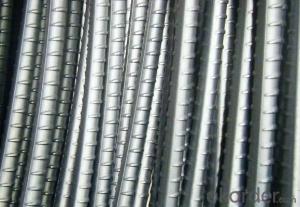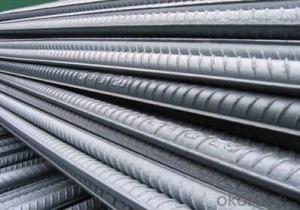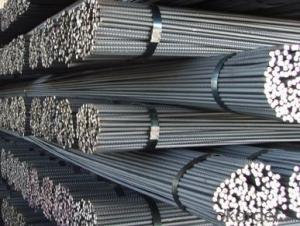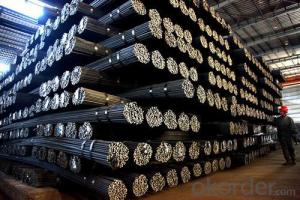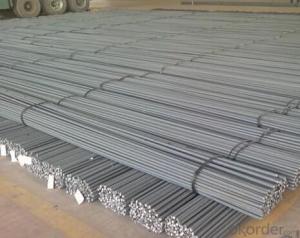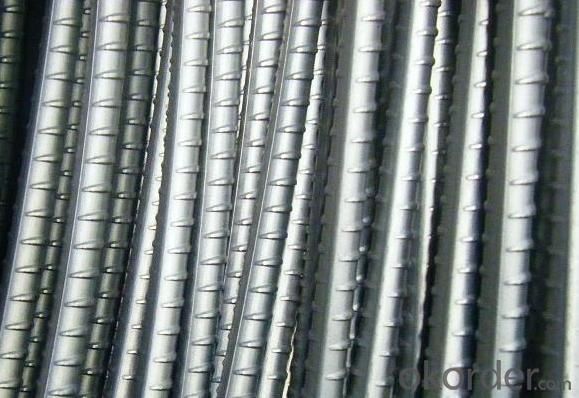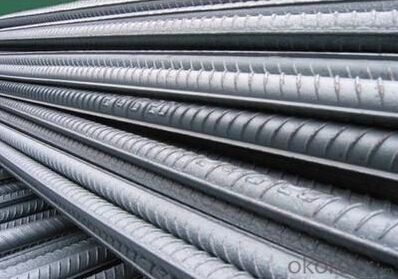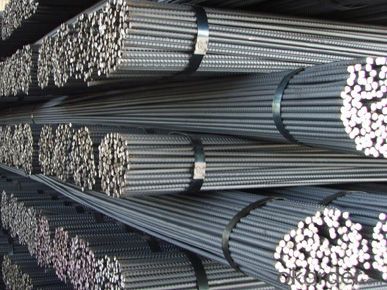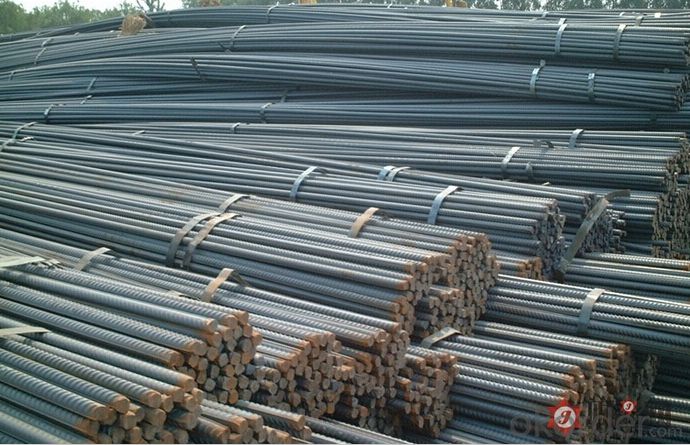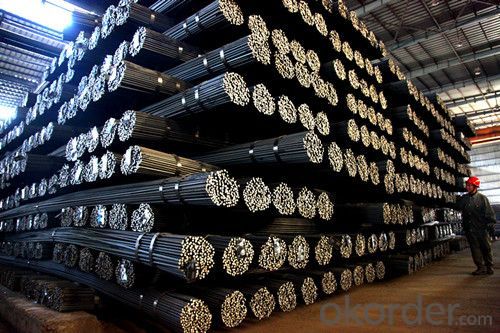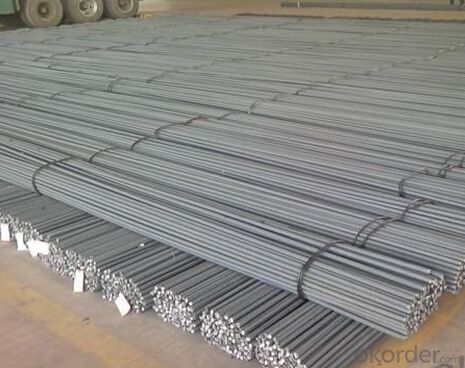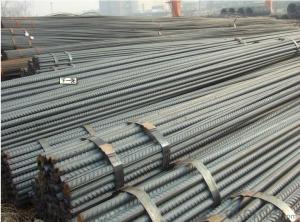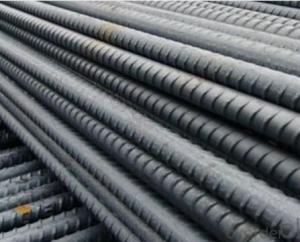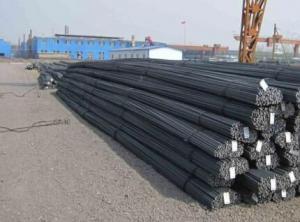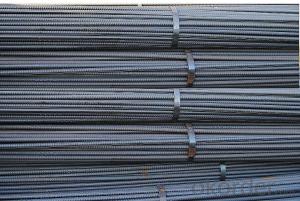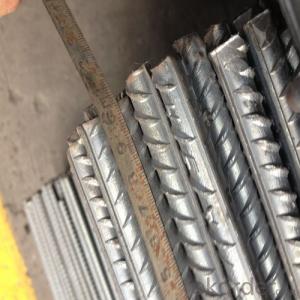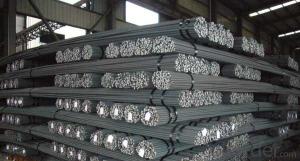High Yield Deformed Bar Grade ASTM A615 & A615M
- Loading Port:
- Tianjin
- Payment Terms:
- TT or LC
- Min Order Qty:
- 50 m.t.
- Supply Capability:
- 10000 m.t./month
OKorder Service Pledge
OKorder Financial Service
You Might Also Like
Specification
High Yield Deformed Bar Grade ASTM A615 & A615M-04a
Details of High Yield Deformed Bar Grade ASTM A615 & A615M-04a
Name | Deformed Bar |
Shape | Round Bar |
Standard | 1.GB1499.2-2007, HRB335, HRB400E 2. ASTM A615 Gr.40, Gr.60 3.BS4449/1997 |
Diameter | 6mm-50mm |
Length | 6m, 8m, 9m,12m as standard or as request |
Test | SGS/UT 100% Elements Testing |
Certificate: | ISO/Mill Certificate |
Service: | 24 hours online service / |
more than 20 years trading and manufacture | |
Quality Assurance: | the third party inspection, such as SGS, BV, TUV…etc. is acceptable |
Packaging Details: | Seaworthy Packaging or as per customer's packing instruction |
Specification of High Yield Deformed Bar Grade ASTM A615 & A615M-04a
Standard | Grade | Yield Strength Mpa | Tensile Strength | Elongation% |
BS4449:1997 | 250 | 250 | 295 | 22 |
460A | 460 | 485 | 12 | |
460B | 460 | 500 | 15 | |
GB1499.2-2007 | HRB335/335E | 335 | 455 | 17 |
HRB400/400E | 400 | 540 | 17 | |
HRB500/500E | 500 | 630 | 16 | |
ASTM A615 & A615M-04a | GRADE40 | 280 | 420 | 12 |
GRADE60 | 420 | 620 | 9 | |
GRADE75 | 520 | 690 | 7 | |
JIS G3112-2004 | SD295A | ≥ 295 | 440-600 | 17 |
SD295B | 295-390 | ≥ 440 | 17 | |
SD345 | 345-440 | ≥490 | 19 | |
SD390 | 390-510 | 560 | 17 | |
SD490 | 490-625 | ≥ 620 | 13 |
Size | WEIGHT | WEIGHT | QUANTITY | ||
LENGTH 6M | LENGTH 12M | LENGTH 6M | LENGTH 12M | ||
6 | 0.222 | 1.332 | 2.664 | 751 | 375 |
8 | 0.395 | 2.37 | 4.74 | 422 | 211 |
10 | 0.617 | 3.702 | 7.404 | 270 | 135 |
12 | 0.888 | 5.328 | 10.656 | 188 | 94 |
14 | 1.21 | 7.26 | 14.52 | 138 | 69 |
16 | 1.58 | 9.48 | 18.96 | 106 | 53 |
18 | 2 | 12 | 24 | 83 | 42 |
20 | 2.47 | 14.82 | 29.64 | 67 | 34 |
22 | 2.98 | 17.88 | 35.76 | 56 | 28 |
25 | 3.85 | 23.1 | 46.2 | 43 | 22 |
28 | 4.83 | 28.98 | 57.96 | 35 | 17 |
32 | 6.31 | 37.86 | 75.72 | 26 | 13 |
36 | 7.99 | 47.94 | 95.88 | 21 | 10 |
40 | 9.87 | 59.22 | 118.44 | 17 | 8 |
50 | 15.42 | 92.52 | 185.04 | 11 | 5 |
CNBM Introduction of High Yield Deformed Bar Grade ASTM A615 & A615M-04a Supplier
CNBM International Corporation is the most import and export platform of CNBM group(China National Building Material Group Corporation) ,which is a state-owned enterprise, ranked in 270th of Fortune Global 500 in 2015.
With its advantages, CNBM International are mainly concentrate on Cement, Glass, Iron and Steel, Ceramics industries and devotes herself for supplying high quality series of refractories as well as technical consultancies and logistics solution.
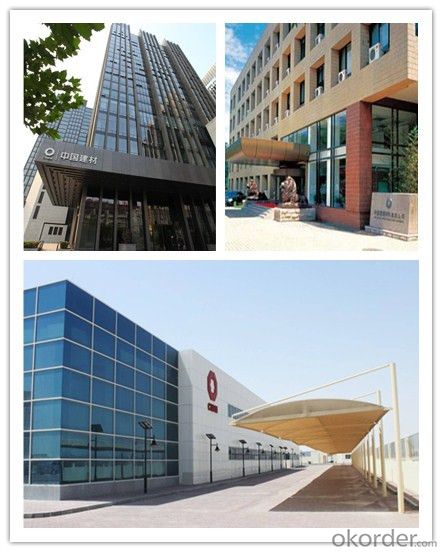
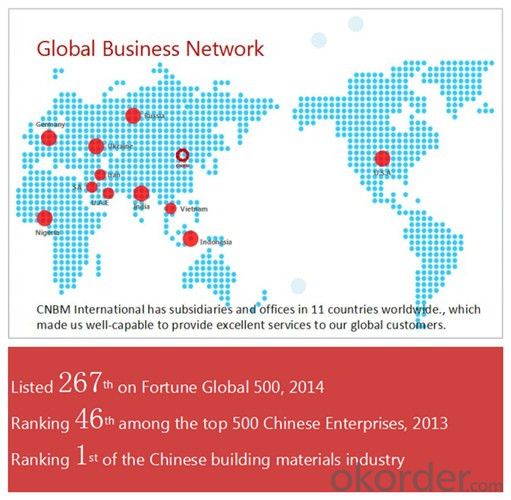
Packaging & Delivery of High Yield Deformed Bar Grade ASTM A615 & A615M-04a
Packaging Detail | Sea worthy packing /as per customer's packing instruction |
Delivery Detail | 15 ~ 40 days after receiving the deposit |
Products Show
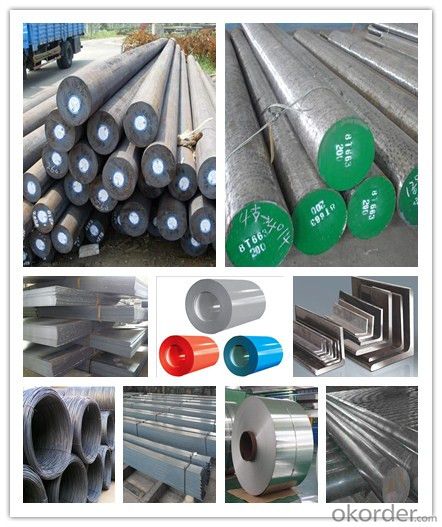
FAQ:
Are you a trading company or manufacturer? | Manufacturer |
What’s the MOQ? | 3 metric ton |
What’s your delivery time? | 15-35 days after downpayment received |
Do you Accept OEM service? | Yes |
what’s your delivery terms? | FOB/CFR/CIF |
What's the Payment Terms? | 30% as deposit,70% before shipment by T/T |
Western Union acceptable for small amount. | |
L/C acceptable for large amount. | |
Scrow ,Paybal,Alipay are also ok | |
Why choose us? | Chose happens because of quality, then price, We can give you both. Additionally, we can also offer professional products inquiry, products knowledge train (for agents), smooth goods delivery, excellent customer solution proposals. |
What's your available port of Shipment? | Main Port, China |
What’s your featured services? | Our service formula: good quality+ good price+ good service=customer's trust
|
Where are your Market? | Covering more than 160 countries in the world |
- Q: What are the main elements in special steel alloys?
- The main elements in special steel alloys can vary depending on the specific type of alloy and its intended application. However, there are several common elements that are often present in special steel alloys. These include: 1. Iron (Fe): Iron is the main component of steel alloys, providing its base strength and durability. 2. Carbon (C): Carbon is a key element in steel alloys, as it significantly influences the hardness and strength of the material. Different levels of carbon content can result in varying properties, such as high carbon steel for increased hardness or low carbon steel for improved ductility. 3. Chromium (Cr): Chromium is commonly added to steel alloys to enhance their corrosion resistance. It forms a protective layer on the surface of the alloy, preventing oxidation and rusting. 4. Nickel (Ni): Nickel is often used in special steel alloys to improve their resistance to heat and corrosion. It also contributes to enhancing the material's strength and toughness. 5. Manganese (Mn): Manganese is commonly added to steel alloys to improve their workability and machinability. It also enhances the material's strength and impact resistance. 6. Molybdenum (Mo): Molybdenum is frequently included in special steel alloys to increase their strength, hardness, and high-temperature resistance. It also improves the alloy's ability to withstand corrosion. 7. Vanadium (V): Vanadium is often added to steel alloys to enhance their strength, toughness, and heat resistance. It also aids in refining the grain structure of the alloy, resulting in improved performance. These are just a few examples of the main elements commonly found in special steel alloys. Depending on the specific requirements and desired properties, other elements such as tungsten, cobalt, copper, and titanium may also be present in varying amounts. The combination of these elements in different proportions allows for the creation of specialized steel alloys with unique properties tailored for specific applications in industries such as aerospace, automotive, construction, and manufacturing.
- Q: How does special steel contribute to the chemical processing industry?
- Special steel plays a crucial role in the chemical processing industry by offering a wide range of benefits that contribute to the overall efficiency and safety of various processes. Firstly, special steel is highly resistant to corrosion, which is an essential characteristic when dealing with corrosive chemicals. This resistance ensures that equipment and pipelines made from special steel can withstand the harsh chemical environments without deteriorating, leading to increased longevity and reduced maintenance costs. Furthermore, special steel provides excellent strength and durability, allowing it to withstand high temperatures and pressures commonly encountered in chemical processing. This strength ensures that equipment such as reactors, heat exchangers, and vessels can operate effectively under demanding conditions, minimizing the risk of failures or accidents. Special steel also offers excellent thermal conductivity, which is highly advantageous in heat transfer applications. This property allows for efficient heat exchange between different fluids, enhancing the overall energy efficiency of chemical processes. By facilitating the effective transfer of heat, special steel aids in optimizing the performance of equipment like condensers, boilers, and evaporators. In addition, special steel is often used in the construction of storage tanks and pipelines for the transportation and distribution of chemicals. Its high resistance to mechanical stress and impact makes it ideal for ensuring the safe containment and transportation of hazardous substances, reducing the risk of leaks or spills that could have serious environmental and safety consequences. Overall, the use of special steel in the chemical processing industry greatly contributes to the reliability, efficiency, and safety of various processes. Its corrosion resistance, strength, thermal conductivity, and durability make it an indispensable material for equipment and infrastructure, ensuring the smooth and secure operation of chemical processing plants.
- Q: How does special steel contribute to the energy sector?
- Special steel contributes to the energy sector by providing high-strength materials that are essential for the construction of various energy infrastructure projects. It is used in the manufacturing of turbines, generators, and power transmission equipment, ensuring efficient energy production and distribution. Additionally, special steel is crucial in the construction of pipelines and storage tanks for the oil and gas industry, enhancing their durability and safety. Overall, the use of special steel in the energy sector plays a vital role in supporting reliable and sustainable energy production.
- Q: What are the common failures or issues with special steel?
- Some common failures or issues with special steel can include brittleness, poor weldability, susceptibility to corrosion, and difficulty in heat treatment. Additionally, defects such as inclusions, voids, or cracks can also be observed, impacting the overall integrity and performance of the steel.
- Q: Can special steel be used in the pharmaceutical industry?
- Yes, special steel can be used in the pharmaceutical industry. Special steel alloys, such as stainless steel, are commonly utilized in pharmaceutical equipment and manufacturing processes due to their corrosion resistance, high strength, and hygienic properties. These steel alloys are suitable for applications such as pharmaceutical storage tanks, piping systems, mixing vessels, and other critical components required for pharmaceutical production.
- Q: What are the different surface cleaning methods used for special steel?
- There are several surface cleaning methods used for special steel, including mechanical cleaning, chemical cleaning, and electrochemical cleaning. Mechanical cleaning involves the use of abrasive tools or equipment to remove dirt, rust, or other contaminants from the surface. Chemical cleaning involves the use of chemicals, such as acids or solvents, to dissolve or remove contaminants. Electrochemical cleaning utilizes an electrical current to remove contaminants and improve the surface finish. Each method is chosen based on the specific requirements and condition of the special steel being cleaned.
- Q: How does special steel perform in high-vibration applications?
- Special steel performs exceptionally well in high-vibration applications due to its superior strength, durability, and resistance to fatigue. These properties enable it to withstand intense vibrations without compromising its structural integrity, resulting in enhanced performance and extended service life in such demanding conditions.
- Q: What are the challenges faced in the manufacturing process of special steel?
- The manufacturing process of special steel involves numerous challenges that need to be addressed to ensure the production of high-quality steel. Some of the main challenges faced in this process are: 1. Raw material selection: Special steels require specific alloying elements in precise proportions to achieve desired properties. Choosing the right raw materials is crucial, as it directly impacts the quality of the final product. Ensuring consistent availability and quality of these raw materials can be a challenge. 2. Alloy design and composition: Designing the alloy composition to meet specific requirements can be complex. Achieving the desired balance of strength, hardness, toughness, corrosion resistance, and other properties requires thorough research, testing, and expertise. Developing new alloys with improved properties can be particularly challenging. 3. Melting and refining: Special steels are typically produced through electric arc furnaces or induction melting. Maintaining precise temperature control, proper cooling rates, and refining processes to eliminate impurities like sulfur, phosphorus, and non-metallic inclusions are crucial. These steps require advanced technology and precise control to ensure consistent quality. 4. Heat treatment: Heat treatment is a critical step in the manufacturing process of special steel. Achieving the desired microstructure and properties through processes like quenching, tempering, annealing, or precipitation hardening can be challenging. Proper temperature control, heating and cooling rates, and time durations are essential for obtaining the desired properties. 5. Quality control and testing: Ensuring consistent quality throughout the manufacturing process is paramount. Regular testing and inspection to detect and eliminate defects, inconsistencies, and non-conformities are necessary. This includes dimensional accuracy, mechanical properties testing, non-destructive testing, and chemical analysis. 6. Production efficiency: Special steel manufacturing often involves complex procedures and longer processing times compared to regular steel production. Optimizing the production process to maximize efficiency, minimize waste, and reduce energy consumption is a constant challenge. Implementing lean manufacturing principles and utilizing advanced technologies can help address these challenges. 7. Environmental considerations: Manufacturing special steel can have a significant environmental impact. Addressing issues like energy consumption, waste management, emissions control, and water usage is essential for sustainable production. Compliance with environmental regulations and adopting eco-friendly practices can be challenging yet necessary. Overcoming these challenges requires a combination of technical expertise, research and development, investment in advanced equipment and technologies, and an ongoing commitment to quality control and process improvement.
- Q: How does special steel contribute to the electrical industry?
- Special steel plays a crucial role in the electrical industry by providing the necessary materials for the production of various electrical components and infrastructure. It offers high strength, thermal resistance, and corrosion resistance, making it ideal for manufacturing transformers, power generators, electrical motors, and transmission lines. Additionally, special steel enables the development of advanced electrical technologies, such as superconductors and magnetic materials, which enhance the efficiency and performance of electrical systems. Overall, special steel contributes to the electrical industry by ensuring the reliability, durability, and innovation of electrical equipment and infrastructure.
- Q: How does special steel perform in terms of thermal expansion?
- Special steel typically performs well in terms of thermal expansion. It has a low coefficient of thermal expansion, meaning it expands and contracts less with temperature changes compared to other types of steel. This makes it more dimensionally stable and less prone to warping or distortion when exposed to heat or cold.
Send your message to us
High Yield Deformed Bar Grade ASTM A615 & A615M
- Loading Port:
- Tianjin
- Payment Terms:
- TT or LC
- Min Order Qty:
- 50 m.t.
- Supply Capability:
- 10000 m.t./month
OKorder Service Pledge
OKorder Financial Service
Similar products
Hot products
Hot Searches
Related keywords
